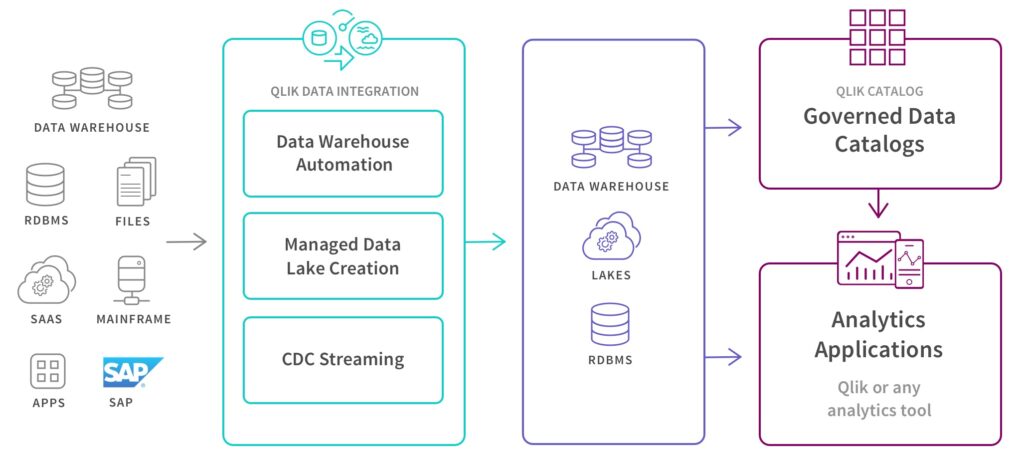Qlik Data Integration is a robust platform that enables organizations to connect, transform, and manage data from diverse sources. It offers a range of modules designed to address specific data integration needs, ensuring seamless data flows and delivering trustworthy, consistent data for analysis. By harnessing the power of Qlik Data Integration, organizations can make informed decisions based on reliable data, enhance operational efficiency, and unlock valuable insights. Let’s delve into the key modules and features of Qlik Data Integration.
- Qlik Replicate: Qlik Replicate allows organizations to efficiently capture, transform, and deliver real-time data from various sources to target systems. It ensures data consistency and integrity across different platforms, databases, and applications. With its intuitive interface and advanced change data capture (CDC) technology, Qlik Replicate minimizes data latency, enabling organizations to make decisions based on up-to-date information.
- Qlik Compose: Qlik Compose provides end-to-end data warehouse automation capabilities. It automates the process of designing, building, and managing data warehouses, making it faster and easier to deliver accurate, analytics-ready data. With its drag-and-drop interface and pre-built templates, Qlik Compose simplifies complex data integration workflows, ensuring data consistency and reducing development time.
- Qlik Data Manager: Qlik Data Manager enables organizations to efficiently profile, cleanse, and transform data to meet their specific requirements. It offers a visual, code-free environment for data preparation and data quality management. With its powerful data transformation capabilities and built-in data profiling and cleansing functions, Qlik Data Manager ensures data accuracy and consistency for reliable analytics.
- Qlik Compose for Data Lakes: Qlik Compose for Data Lakes is a module designed to automate the creation and management of data lakes. It simplifies the process of collecting, organizing, and transforming data from various sources into a unified, scalable data lake architecture. With Qlik Compose for Data Lakes, organizations can accelerate data lake creation, ensure data quality, and enable self-service access to data for analytics.
- Qlik Compose for Data Warehouse: Qlik Compose for Data Warehouse focuses on automating the data warehouse lifecycle. It enables organizations to build, populate, and manage data warehouses quickly and efficiently. The module automates tasks such as schema design, data loading, and incremental updates, reducing the time and effort required for data warehouse development and maintenance.
- Qlik Enterprise Manager: Qlik Enterprise Manager provides centralized management and monitoring capabilities for Qlik’s Data Integration platform. It allows administrators to efficiently manage data integration processes, track performance metrics, and troubleshoot issues. With Qlik Enterprise Manager, organizations can ensure the smooth operation of their data integration workflows, optimize resource utilization, and proactively address potential bottlenecks.
- Data Streaming (CDC): Data Streaming, or Change Data Capture (CDC), is a critical capability of Qlik’s Data Integration platform. It enables organizations to capture and replicate real-time data changes from various sources to target systems. By continuously streaming data changes, organizations can keep their analytical systems up to date, ensuring that insights are based on the most recent information available.
- Data Warehouse Automation: Data Warehouse Automation is a key feature of Qlik’s Data Integration platform that simplifies and accelerates the process of building and managing data warehouses. It leverages automation capabilities to generate optimized code, handle data transformations, and manage data lineage. With Data Warehouse Automation, organizations can reduce development time, ensure consistency across data warehouse environments, and enhance agility in adapting to evolving data requirements.
- Data Lake Creation: Qlik’s Data Integration platform offers capabilities for creating and managing data lakes, which are central repositories for storing and processing vast amounts of structured and unstructured data. Data lakes provide a foundation for advanced analytics and machine learning initiatives. Qlik’s data lake creation features facilitate the ingestion, organization, and governance of data within the lake, enabling organizations to leverage the power of big data analytics.
- Application Automation: Qlik’s Data Integration platform also includes application automation capabilities, allowing organizations to automate data integration tasks within their business applications. By embedding data integration processes into applications, organizations can enhance productivity, improve data quality, and enable self-service data access for end-users.

Technical Details and Requirements:
To leverage the capabilities of Qlik Data Integration, certain technical details and requirements should be considered:
- Supported Platforms: Qlik Data Integration supports major operating systems, including Windows and Linux, ensuring flexibility in deployment.
- Hardware Requirements: The hardware requirements may vary depending on the volume and complexity of data integration tasks. It is recommended to have sufficient processing power, memory, and storage capacity to handle data integration processes effectively.
- Integration Connectivity: Qlik Data Integration supports a wide range of data sources, including databases, file systems, cloud platforms, and enterprise applications. It offers connectors and adapters for seamless integration with popular data sources and platforms.
- Scalability and Performance: Qlik Data Integration is designed for scalability, allowing organizations to handle large volumes of data and support growing data integration needs. Performance optimization features, such as parallel processing and distributed architecture, ensure efficient data processing.
- Security and Governance: Qlik Data Integration provides robust security features to protect sensitive data during the integration process. It supports secure connections, data encryption, and role-based access controls to ensure data privacy and compliance with regulatory requirements.
Qlik Data Integration offers a comprehensive platform to streamline and optimize data integration processes. With its modules like Qlik Replicate, Qlik Compose, Qlik Catalog, and Qlik Data Manager, organizations can capture, transform, manage, and govern their data effectively. The technical details and requirements of Qlik Data Integration ensure seamless integration with various data sources, scalability, performance, and adherence to security and governance standards.
Embrace the power of Qlik Data Integration to unlock the full potential of your data and gain valuable insights. Contact our team today to explore how Qlik Data Integration can revolutionize your data management practices and drive better business outcomes.